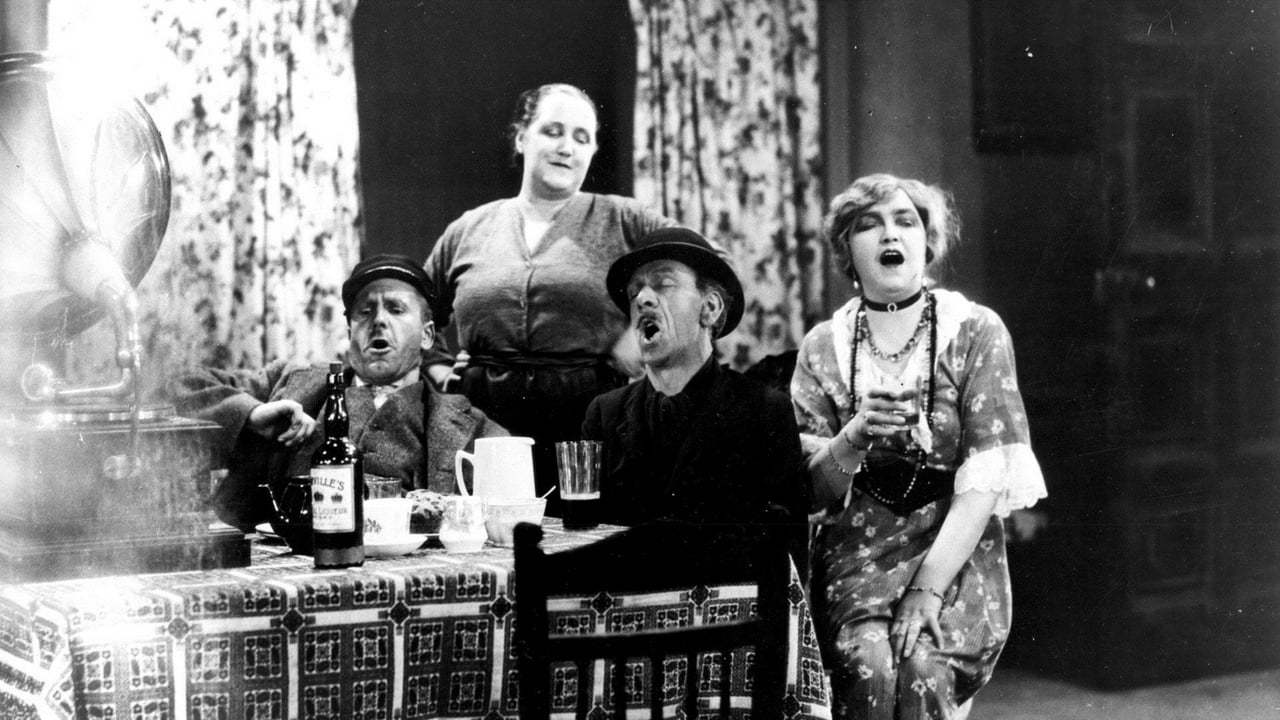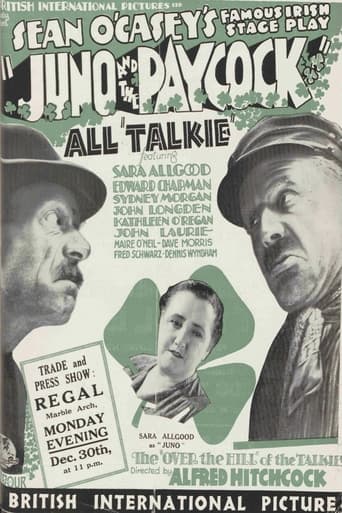

This is a well done drama with lots of comedy in it as well. It is old and "old looking" but if you don't mind earlier films this is a decent Hitchcock effort. I can't believe how low it is rated here.
... View More"Juno and the Paycock is available on at least six DVD labels plus a VHS tape. The best quality is provided by the tape which unfortunately is missing the conclusion of the final scene. Therefore I recommend the St Clair copy which chops off heads occasionally and has two or three poorly graded images at the beginning. "Juno and the Peacock" (or Paycock) is not a movie that most Alfred Hitchcock fans will enjoy, being rather stagey, downbeat and slow- moving, but it does preserve the fine, stagey performances by Edward Chapman (as the Paycock, unrecognizable here in his film debut), Sidney Morgan (the Abbey player, NOT the director as IMDb once contended - I assume they have now corrected this error), Kathleen O'Regan, John Laurie (movie debut), and Sara Allgood. Although filmed for the most part in long takes, Hitch has opened the play up a bit, which certainly helps the pace. And Jack Cox photographed in his usual all-gray, no-whites-no-blacks style, which certainly contributes to the downbeat air.
... View MoreIt begins with a poor Dublin family in their shabby apartment, in the hallway of which a candle burns under the statue of the Virgin Mary. There's the solid mother, Juno Boyle (Sara Allgood); the blowhard father (Edward Chapman), the impulsive and love-stricken daughter (Kathleen O'Regan), and the brooding son who has lost an arm in the service of the Irish Republican Army (John Laurie).Times are hard. Not only does the IRA and its machinations hover in the background but Mr. Boyle has run up a bar bill at Foley's that looks more like somebody's telephone number.Then -- out of the blue -- a stroke of good luck! A dislike cousin of Mr. Boyle has died and left him upwards of 1500 pounds, a fortune. Act II: Everyone is invited into the newly bedecked Boyle parlor and is given a drop to drink and a chance to listen to the gramophone. The audience has to sit through four additional songs, sung live, including "Those Endearing Young Charms." Then -- also out of the blue -- tragedy strikes. The feckless deceased cousin failed to mention Mr. Boyle by name, saying only that his fortune be distributed among his "cousins." Well, the deceased's cousins come flocking in from all corners of the globe and the money suffers the fate of the Jarndyce fortune in "Bleak House." The lawyers get it all.Everybody begins demanding back the furniture and other goods they've given Mr. Boyle on account. His best friend steals a bottle of stout and slips it into his pocket. Mr. Kelly shows up and runs off with the beautiful new suit of Mr. Boyle. Mr. Kelly, the funniest character in the story, is decidedly Jewish. "I could call you all kinds of names," he shouts at Boyle, "but I won't, you cheap, lying goniff!" The tragedy isn't at an end. Young Mary gets knocked up by her dashing English boyfriend -- "with the walking stick and the gloves." And the brooding son is revealed as an informer responsible for the death of the IRA commandant and is taken away and executed.Last scene. Mrs. Boyle is all alone, praying and weeping at the foot of the Virgin's statue. "Oh, blessed Virgin, where was your pity?" Then she staggers off stage. It's like de Unamuno said. There are no workable systems of belief. There's only faith itself.I know this is supposed to be good because, after all, it combines Alfred Hitchcock with Sean O'Casey. That means I'm bad, because I didn't think much of it and my mind drifted throughout. The performers seemed to have forgotten that they're no longer in front of a live audience because the overacting is outrageous. Sometimes, I'm certain, it was designed to be funny, and it is -- like Barry Fitzgerald's pompous orator at the opening. At other times, the cries and wild gesticulations seem to belong to a Cecil B. DeMille silent movie. And, though most of the parts are cast well enough, there is Mr. Boyle at the center and he's not funny, even when he's supposed to be. He's just unpleasant.What sparkle there is in this film comes from the poetry of everyday Irish speech. What ornate phraseology! "It blowed and it blowed and it blowed. 'Blew' is the right word, but the sailors say 'blowed.'" They can drop in a quote from Robert Burns ("man's inhumanity to man....") and it goes unnoticed.Well, the play really required a seasoned director and less old-fashioned acting and it got neither here. I'd love to have seen what Hitchcock might have done with this when he was at his peak. As it is, without quite measuring up, it resembles an episode of the Honeymooners only the sadness is real and Ralph doesn't hug Alice at the end.
... View MoreBefore I begin the review, I would like to point out that watching this film isn't easy--particularly for people aren't used to the strong accents. That's because in addition to struggling to understand them, it gets worse because the sound is so bad AND there are no closed captions. I hope there is a better and cleaned up version out there, but I doubt it. My copy is from a cheap box set of Hitchcock's films, but whenever I have seen this film on DVD, it's been in similar sets--where captions and film preservation aren't particularly important.As for the film, like almost all of Hitchcock's films before 1934, most of his films defy a specific genre. While he did THE LODGER, most of his silent and early sound films have nothing to do with suspense or mystery. So the fact that JUNO AND THE PAYCOCK might seem nothing like a Hitchcock film is simply because there was no "Hitchcock Style" yet.JUNO AND THE PAYCOCK is a look at an Irish family and their rather ordinary and stereotypical lives. The husband, the Captain, isn't a captain at all but a lazy drinker who avoids work at all costs. The wife, Juno (Sara Algood), is a long-suffering woman who tries to make good with what they've got--which isn't much. The first 30 minutes of the film features no tangible plot--just the Captain talking and talking and talking with various friends and then his wife. This is all pretty dull. Later, the couple learn that they've come into an inheritance and their lives are thrown into a tizzy. They begin having all kinds of ideas about living high off the hog, only by the end of the film to find out that it's all for naught. Sadly, there really isn't more to the film than this.I think how good this film is to the viewer probably depends a lot on your perspective. I am sure an Irish person or someone with Irish heritage would look at this a lot different than me, an American without a drop of "green" blood. To me, it's all just a long and dull talk-fest with little to recommend it. Hitchcock has obviously worked hard to create such vivid characterizations here, but don't expect THE QUIET MAN or the like.
... View More